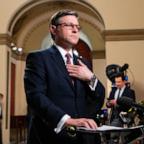Rising national debt raises prospects of eventual inflation
— -- Inflation is as dead as the Wicked Witch of the West in a waterfall. The consumer price index has actually fallen 1.3% in the past 12 months. So why is everyone so worried about soaring prices?
In a word: debt. The government owes the world $11.4 trillion — $37,000 for every person in the U.S. In the next fiscal year, the government will add $1.8 trillion to the deficit.
The government could simply print more dollars to pay off our debts with cheap currency — a tempting but inflationary solution. Politicians wouldn't have to ask citizens to pay for the government's services, and citizens wouldn't have to think about the actual cost of what they demand — until, of course, the currency collapses, interest rates soar and the economy craters. Some on Wall Street are betting on just that scenario. Universa Investments — linked to Nassim Nicholas Taleb, author of Wall Street's biggest book, The Black Swan: The Impact of the Highly Improbable— is adding strategies that will soar if inflation takes off. Respected hedge fund adviser 36 South Investment Managers is raising $100 million for a fund that will bet on soaring price increases. And Marc Faber, editor of the Gloom Boom & Doom Report, a newsletter, predicts that U.S. inflation will someday match Zimbabwe's — that would be 236 million percent a year.
If inflation does hit, it won't be this year, barring a major jump in oil prices or a drastic change in government philosophy. You don't get inflation in an economy that's as slack as this one. And, many economists say, the Federal Reserve has many tools to contain inflation once the economy turns around. But one thing the Fed doesn't have is the ability to control federal spending. And that, ultimately, could be the thing that pushes the inflation rate higher.
Not now
If you're worried about inflation rearing its ugly head soon, relax. Inflation just isn't going to happen in this economy. "A lot of the worries about immediate inflation are examples of financial illiteracy," says David Wyss, chief economist for Standard & Poor's. "You won't get inflation until the economy gets back, and that's at least five years out."




